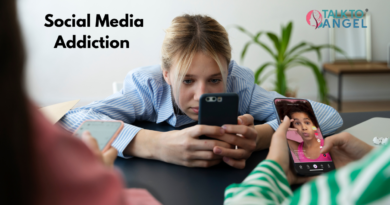Phone Addiction: Is Your Phone Controlling You?
Smartphones have become essential in today’s fast-paced digital environment. They connect us, entertain us, and help us work efficiently. However, for many, the relationship with their phones has turned into an addiction, negatively affecting mental health, relationships, and productivity. But how do you know if your phone controls you, and what can you do about it? Let’s explore.
What is Phone Addiction?
Phone addiction, also known as nomophobia (no-mobile-phone phobia), is the excessive use of smartphones to the point where it interferes with daily life. People addicted to their phones may experience anxiety, restlessness, or even depression when separated from their devices.
Signs That Your Phone is Controlling You
- Excessive Screen Time: Spending hours scrolling through apps without realizing it.
- Disruption of Sleep: Checking your phone late at night or first thing in the morning.
- Neglecting Responsibilities: Ignoring work, studies, or chores due to phone usage.
- Social Withdrawal: Preferring virtual interactions over real-life relationships.
- Mood Swings: Feeling anxious or irritable when away from your phone.
How Phone Addiction Impacts Your Life
- Mental Health: Increased screen time is linked to anxiety, depression, and low self-esteem.
- Relationships: Excessive phone use can lead to emotional distance from loved ones.
- Physical Health: Prolonged use can cause eye strain, poor posture, and sleep disturbances.
- Productivity: Constant distractions reduce focus and efficiency at work or study.
How to Manage Phone Addiction
- Set Boundaries: Allocate specific times for phone use and stick to them.
- Turn Off Notifications: Reduce distractions by muting non-essential apps.
- Create Phone-Free Zones: Keep your phone out of bedrooms, dining areas, or workspaces.
- Practice Digital Detox: Schedule regular breaks from all devices.
- Engage in Offline Activities: Pick up hobbies like reading, painting, or exercising.
Does ThePsychowellness and TalktoAngel Provide Therapy for Phone Addiction?
Yes, both ThePsychowellness offers In-clinic counseling and TalktoAngel provides online therapy for phone addiction. Their licensed psychologists and therapists use evidence-based techniques like Cognitive Behavioral Therapy (CBT) to help individuals identify the root causes of their addiction, manage compulsive behaviors, and develop healthier habits. They also provide tailored interventions for co-occurring issues like anxiety or depression that might exacerbate phone addiction.
Meet the Best Psychologists at ThePsychowellness for Phone Addiction Therapy
If phone addiction is affecting your mental health, relationships, or productivity, the team at ThePsychowellness is equipped to guide you toward recovery. Their experienced psychologists use evidence-based techniques to help clients regain control over their phone usage and improve overall well-being.
- Dr. R. K. Suri: A senior clinical psychologist specializing in addiction therapy, including phone addiction. He uses techniques like CBT and neurofeedback to help individuals break compulsive habits.
- Mr. Utkarsh Yadav: A counseling psychologist focused on stress and behavior modification, guiding clients to develop healthier digital habits.
- Ms. Gurleen Kaur: Expert in managing anxiety and behavioral concerns linked to excessive phone use, fostering emotional resilience.
- Ms. Mansi: A child psychologist helping young clients and their families manage screen time and address related behavioral issues.
- Ms. Dhristi Gakhar: Skilled in identifying underlying causes of phone addiction and offering tailored therapeutic interventions.
- Ms. Sangeeta Pal: Specializes in mindfulness strategies and lifestyle changes to combat over-reliance on technology.
- Ms. Riya Rathee: Helps clients reduce screen-induced stress through relaxation techniques and coping strategies.
- Ms. Sakshi Dhankhar: Supports young adults in balancing academics, social life, and technology use.
- Ms. Tanu Sangwan: Focuses on cognitive restructuring and habit reversal to break the cycle of phone dependency.
- Ms. Srishti Jain: Encourages self-reflection and personal growth to address the emotional roots of phone addiction.
The team also provides assessments for phone addiction, such as the Smartphone Addiction Scale (SAS), to understand the severity of the issue and create customized recovery plans. Whether online or in-person, ThePsychowellness offers comprehensive support to help you regain control and lead a balanced life.
How to Seek Help for Phone Addiction
- Contact Psychowellness Center: Visit their website or call to schedule an appointment for online or in-person therapy.
- Reach Out to TalktoAngel: Book a session with their therapists through their platform for professional online counseling.
Conclusion
Phone addiction is a growing concern in our hyperconnected world. Recognizing the problem and taking proactive steps is essential for maintaining mental and physical well-being. If you feel your phone usage is spiraling out of control, seeking therapy can be a game-changer. Both ThePsychowellness and TalktoAngel provide effective support to help you regain control of your life and establish a healthier relationship with technology.
Your mental well-being is worth it, so start now!
References
- Lin, Y.-H., et al. (2014). Development and validation of the Smartphone Addiction Scale (SAS). PLoS ONE.
- Kuss, D. J., & Griffiths, M. D. (2012). Internet and smartphone addiction: Psychological and behavioral aspects. Psychology Research and Behavior Management.
- TalktoAngel. (n.d.). https://www.talktoangel.com/.
Psychowellness Center. (n.d.). https://www.psychowellnesscenter.com.




